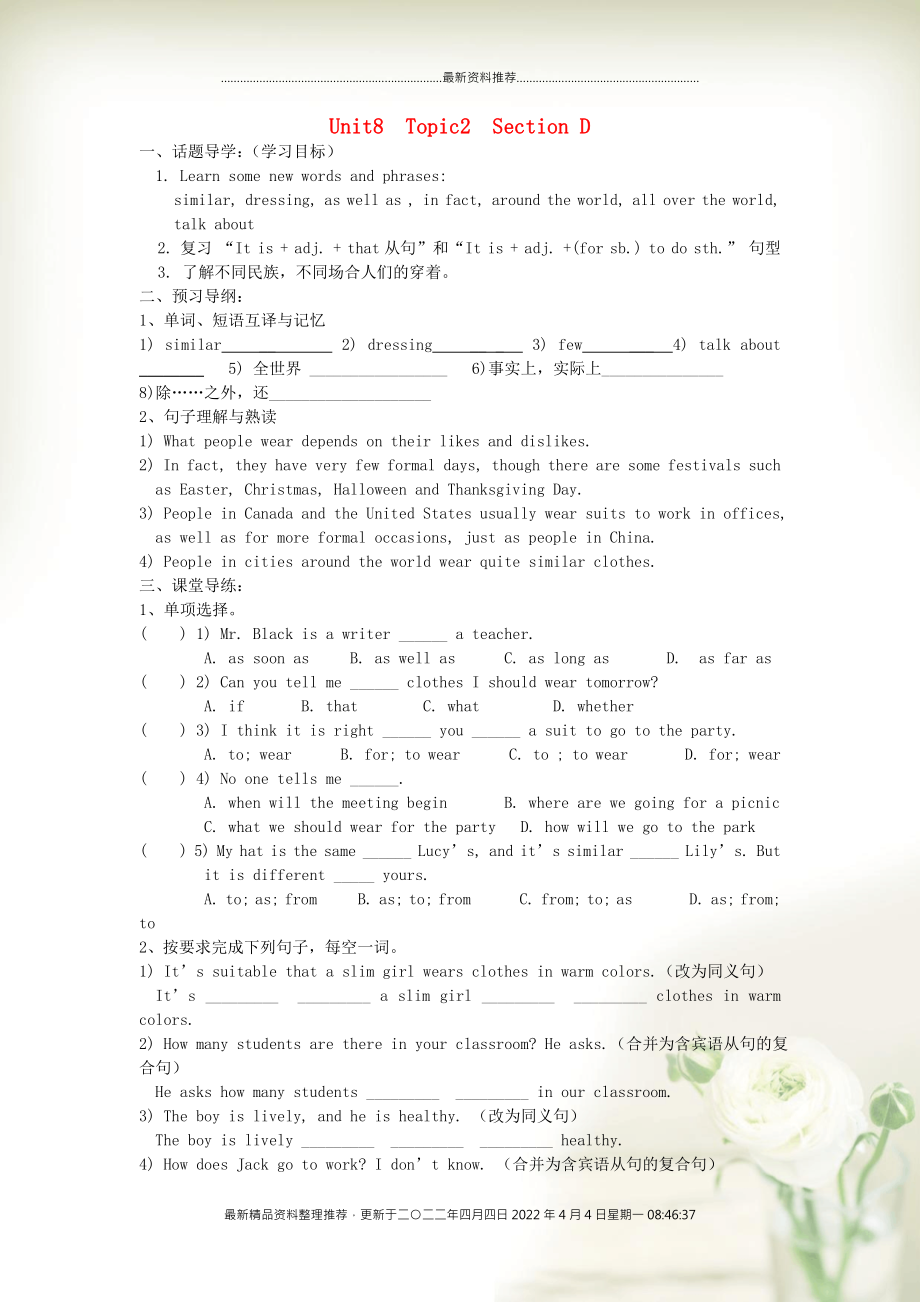《(新新導(dǎo)學(xué)案)廣東省清遠(yuǎn)市八年級(jí)英語(yǔ)下冊(cè) Unit 8 Our Clothes Topic 2 We can design our own uniforms SectionD導(dǎo)學(xué)案 (新版)仁愛版》由會(huì)員分享����,可在線閱讀,更多相關(guān)《(新新導(dǎo)學(xué)案)廣東省清遠(yuǎn)市八年級(jí)英語(yǔ)下冊(cè) Unit 8 Our Clothes Topic 2 We can design our own uniforms SectionD導(dǎo)學(xué)案 (新版)仁愛版(3頁(yè)珍藏版)》請(qǐng)?jiān)谘b配圖網(wǎng)上搜索���。
1�、……………………………………………………………最新資料推薦…………………………………………………
Unit8 Topic2 Section D
一����、話題導(dǎo)學(xué):(學(xué)習(xí)目標(biāo))
1. Learn some new words and phrases:
similar, dressing, as well as , in fact, around the world, all over the world, talk about
2. 復(fù)習(xí) “It is + adj. + that從句”和“It is + adj. +(for sb.) to do sth.” 句型
3. 了解
2、不同民族�,不同場(chǎng)合人們的穿著。
二���、預(yù)習(xí)導(dǎo)綱:
1����、單詞�、短語(yǔ)互譯與記憶
1) similar __ 2) dressing __ _ 3) few ___ 4) talk about ________ 5) 全世界 _________________ 6)事實(shí)上,實(shí)際上_______________
8)除……之外����,還____________________
2、句子理解與熟讀
1) What people wear depends on their likes and dislikes.
2) In fact, t
3、hey have very few formal days, though there are some festivals such as Easter, Christmas, Halloween and Thanksgiving Day.
3) People in Canada and the United States usually wear suits to work in offices, as well as for more formal occasions, just as people in China.
4) People in cities around the w
4���、orld wear quite similar clothes.
三�、課堂導(dǎo)練:
1���、單項(xiàng)選擇���。
( ) 1) Mr. Black is a writer ______ a teacher.
A. as soon as B. as well as C. as long as D. as far as
( ) 2) Can you tell me ______ clothes I should wear tomorrow?
A. if B. that C. what
5、D. whether
( ) 3) I think it is right ______ you ______ a suit to go to the party.
A. to; wear B. for; to wear C. to ; to wear D. for; wear
( ) 4) No one tells me ______.
A. when will the meeting begin B. where are we going for a picnic
C. wha
6�、t we should wear for the party D. how will we go to the park
( ) 5) My hat is the same ______ Lucy’s, and it’s similar ______ Lily’s. But it is different _____ yours.
A. to; as; from B. as; to; from C. from; to; as D. as; from; to
2、按要求完成下列句子���,每空一詞�。
1) It’s suitable th
7�、at a slim girl wears clothes in warm colors.(改為同義句)
It’s _________ _________ a slim girl _________ _________ clothes in warm colors.
2) How many students are there in your classroom? He asks.(合并為含賓語(yǔ)從句的復(fù)合句)
He asks how many students _________ _________ in our classroom.
3) The boy is livel
8、y, and he is healthy. (改為同義句)
The boy is lively _________ _________ _________ healthy.
4) How does Jack go to work? I don’t know. (合并為含賓語(yǔ)從句的復(fù)合句)
I don’t know _________ _________ _________ ________ _________.
5) It is necessary that everyone obeys the traffic rules. (改為一般疑問句)
_______
9���、_ _________ ________ ________ everyone obeys the traffic rules?
3���、根據(jù)漢語(yǔ)意思完成句子。
1) 長(zhǎng)城聞名于世界���。
The Great Wall is famous ____________________________________ .
2) 事實(shí)上�,我根本不喜歡蘋果����。
_____________________, I don’t like apples at all.
3) 瑪麗會(huì)唱歌也會(huì)跳舞。
Mary can sing _____________________ dance.
4) 你們?cè)谡?/p>
10����、論什么?
What are you _____________________?
5 ) 人們的穿著取決于他們的喜好���。
What people wear __________________ their likes and dislikes.
四�、復(fù)習(xí)自測(cè):看圖短文填空�,每空一詞。
Some students think it is important 1 students to wear uniforms 2 school uniforms can not only show good discipline but 3 make us look ac
11����、tive. Besides, school uniforms are cheaper 4 casual clothes. What’s more, it shows no difference between students if everyone 5 school uniforms. But other students have different opinions. They say that school uniforms 6 ugly on them. What’s more, it seems boring that everyone wears the s
12、ame 7 every day. They want their clothes to 8 colorful.
In my 9 , students should wear uniforms. But we should be allowed to 10 our own uniforms.
1.__________ 2.__________ 3.__________ 4.__________ 5.__________
6.__________ 7.__________ 8.__________ 9.__________ 10.
13�、__________
五、課文解讀:
(1) like something but not the same 像某物���,但不相同�。
注意以下幾個(gè)短語(yǔ)的介詞:be the same as 與……相同;be different from與……不同���;be similar to與……相似���,如:
My coat is the same as yours. 我的外套與你的相同。
The weather in Beijing is different from that in Guangzhou. 北京的天氣與廣州的不同���。
Jenny is similar to her moth
14���、er. 珍妮長(zhǎng)得像她媽媽。
(2) People in Canada and the United States usually wear suits to work in offices, as well as for more formal occasions, just as people in China.中國(guó)和美國(guó)����、加拿大一樣,人們除了在重要場(chǎng)合穿西服����,在辦公室上班也是如此。
as well as “除……之外����,還”, 如:
He likes football as well as basketball. 他喜歡足球����,也愛籃球����。
Joan, as well as
15���、Jenny, is leaving for Beijing tomorrow. 瓊明天前往北京,珍妮也是���。
(3) People in cities around the world wear quite similar clothes.世界各地的城里人穿著都十分相似����。
around the world意為“全世界����,相當(dāng)于all over the world/ throughout the world.
六、評(píng)價(jià)
內(nèi)容
等級(jí)
自評(píng)
小組長(zhǎng)評(píng)價(jià)
預(yù)習(xí)情況
A
B
C
D
課堂表現(xiàn)
A
B
C
D
小組合作
A
B
C
D
16�、
Section D
二、1����、1)相像的 2)穿戴 3)幾乎沒有 4) 談?wù)?
5) all over the world/ around the world 6) in fact 7) as well as
三、
1���、B C B C B
2����、1)suitable for; to wear 2)there are 3) as well as
4) how Jack goes to work 5) Is it necessary that
3、1) all over the world 2) In fact 3) as well as
4) talking about 5) depends on
四���、1����、for 2����、because 3、also 4�、than 5、wears
6����、look 7、clothes 8����、be 9、opinions 10���、design
最新精品資料整理推薦����,更新于二〇二二年四月四日2022年4月4日星期一08:46:37
 (新新導(dǎo)學(xué)案)廣東省清遠(yuǎn)市八年級(jí)英語(yǔ)下冊(cè) Unit 8 Our Clothes Topic 2 We can design our own uniforms SectionD導(dǎo)學(xué)案 (新版)仁愛版
(新新導(dǎo)學(xué)案)廣東省清遠(yuǎn)市八年級(jí)英語(yǔ)下冊(cè) Unit 8 Our Clothes Topic 2 We can design our own uniforms SectionD導(dǎo)學(xué)案 (新版)仁愛版

